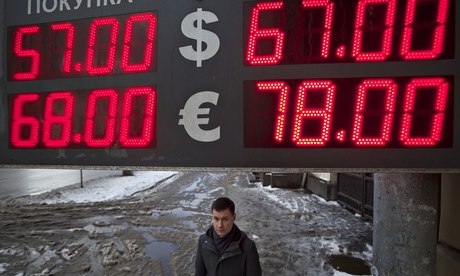Franchising, retail, business

20/01/2015
Last year 44% of chief executives surveyed thought global growth would improve but that has fallen to 37% for 2015
Dennis Nally, chairman of PwC said: ‘CEO confidence is down notably in oil-producing nations around the world as a result of plummeting crude oil prices. Russia CEOs, for example, were the most confident in last year’s survey ...’ Photograph: Pavel Golovkin/AP
Fresh evidence of the impact of the plunging oil price emerged on Tuesday when business leaders in Russia and other energy-producing nations said it had knocked their confidence in the outlook for the world economy.
After being the most upbeat executives at last year’s meeting of the World Economic Forum, the plunge in the value of the rouble caused by the collapsing cost of crude has badly affected the mood of Russian bosses polled by PricewaterhouseCoopers.
PwC said their annual survey of business leaders showed a less bullish mood than a year ago and, published on the eve of the start of the four day gathering in the Swiss mountains, coincided with a move by the International Monetary Fund to downgrade its forecasts for of world growth.
The Washington-based IMF said the boost from lower oil prices is being outweighed by a host of negative factors and it now expects global growth to edge up only slightly from 3.3% last year to 3.5% this year. That is down from a 3.8% forecast for 2015 in its World Economic Outlook published in October. It forecasts growth picking up only slightly next year and cut its 2016 forecasts from 4% to 3.7%.
PwC surveyed 1,300 business leaders and found they were less optimistic that they were a year ago.
Last year 44% of chief executives surveyed thought global growth would improve but that has fallen to 37% for 2015. Dennis Nally, chairman of PwC said: “CEO confidence is down notably in oil-producing nations around the world as a result of plummeting crude oil prices. Russia CEOs, for example, were the most confident in last year’s survey, but are the least confident this year. Confidence also slipped among CEOs in the Middle East, Venezuela, and Nigeria “
More than twice as many of the company bosses as last year thought global economic growth will decline, more than twice as many as a year ago. The survey was conducted at the end of a year in which Chinese growth had slowed and the eurozone stagnated, raising expectations that Mario Draghi, head of the European Central Bank will try to bolster the eurozone by starting QE on Thursday.
Lower oil prices prompted the IMF to cut its outlook for big oil exporters, including Nigeria and Saudi Arabia. But it says the fall in the oil price, which for Brent crude is now below $50 a barrel, also presents opportunities to reform energy subsidies and taxes in both oil exporters and importers.
Olivier Blanchard, IMF director of research, said: “New factors supporting growth – lower oil prices, but also depreciation of euro and yen – are more than offset by persistent negative forces, including the lingering legacies of the crisis and lower potential growth in many countries”.
“This makes for a complicated mosaic ... good news for oil importers, bad news for oil exporters. Good news for commodity importers, bad news for exporters. Continuing struggles for the countries which show scars of the crisis, and not so for others. Good news for countries more linked to the euro and the yen, bad news for those more linked to the dollar,” Blanchard said.
The IMF left its UK forecasts largely the same, continuing to project growth of 2.7% this year.
Chancellor George Osborne said: “Today’s IMF forecast shows that Britain is pulling ahead, while the global economy is being downgraded. There’s confirmation that we grew faster than any other major economy last year, and we’re set to grow faster this year. But there are risks out there in the global economy and it’s a timely reminder that we’ve got to go on working through our long-term economic plan if we want to stay ahead.”
Britain is expected to lose its place as the fastest-growing major economy to the US this year, with UK growth forecast at 2.7% and the US at 3.6%.
The bosses surveyed in the UK by PwC were more optimistic than their EU counterparts. But Ian Powell, UK chairman and senior partner at PwC, said that “the high levels of optimism we saw last year have been tempered by concerns about access to key skills, disruptive trends and geopolitical uncertainty”.
The PwC survey found that chief executives were targeting the US as their most important market for growth over the next 12 months, placing it ahead of China for the first time since the question was first included in the survey five years ago. Some 38% of chief executives said the US was among their top-three overseas growth markets, compared with 34% for China, 19% for Germany, 11% for the UK and 10% for Brazil.
The US was the only major economy where the IMF had raised growth forecasts for the next two years. It saw a boost from lower oil prices and strong domestic demand helping the US economy to grow 3.6% this year, up markedly from a 3.1% forecast made in October. For the eurozone, the IMF expected a drag from weaker investment prospects, particularly thanks to a knock-on effect on exporters from an emerging markets slowdown. The IMF predicted eurozone growth of 1.2% this year, down from 1.3% in October. It has also cut its 2016 forecast to 1.4% from 1.7%.
Fonte:http://www.theguardian.com/business/2015/jan/20/davos-2015-oil-price-falling-confidence?CMP=EMCNEWEML6619I2